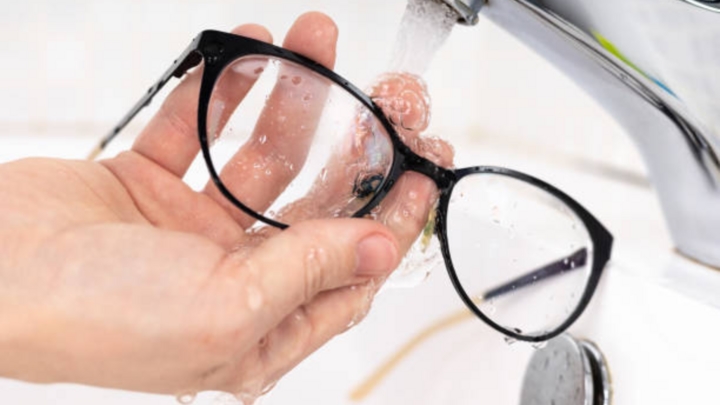Eyeglasses serve multiple purposes: they protect our eyes from wind, sunlight, and debris; they correct refractive issues such as myopia, hyperopia, and astigmatism; and they are a fashion accessory that expresses our personality and completes our style.
It’s important to take care of our lenses as scratches and dirt can not only affect their appearance but also hinder our vision and impact our health. Soaking eyeglasses in water is a basic yet effective way to care for this important accessory.
What are the benefits of soaking eyeglasses in water?
Not everyone pays attention to cleaning and maintaining their eyeglasses, which can lead to fingerprints, dirt, and scratches over time. One of the most effective and simplest methods of care is to soak them in water. This offers the following advantages:
Easier Cleaning
Whether they are used for nearsightedness, farsightedness, or as sunglasses, eyeglasses accumulate dirt and grime from direct contact with our skin, cosmetics, and environmental dust; they may even get coated with grease while cooking.
Soaking eyeglasses in water, especially warm water, helps to soften and dissolve stubborn dirt lodged in the small crevices of the frames and lenses. This deep cleaning method is difficult to achieve through regular wiping. After soaking, simply use a soft cloth to dry them, and your eyeglasses will be as good as new, clean and shiny.
Quality Check
For specialized eyeglasses such as swimming goggles or safety glasses, soaking them in water is a way to check their quality and ensure they are not leaking. If air bubbles appear in the water, it indicates that the glasses may have cracks or some form of damage.

What’s the benefit of soaking eyeglasses in water? (Illustration: Istock)
Protection from Damage
Soaking eyeglasses in water is also a way to protect them from potential damage. When lenses get dusty or sandy, using paper or a cloth to wipe them immediately can cause scratches. Instead, soak the eyeglasses in water first to soften the dirt particles, and then gently wipe them off without harming the lenses.
This is especially important for eyeglasses with anti-reflective or scratch-resistant coatings, as these coatings are typically sensitive to mechanical impacts, and soaking helps minimize the risk of damage.
Preventing Foggy Lenses
One common issue with eyeglasses is fogging, especially when moving from a cold environment to a warmer one, or when entering an air-conditioned room. This phenomenon is annoying, affects our vision, and can be dangerous when driving or performing tasks that require concentration.
To address this issue, soak your eyeglasses in water or an anti-fog solution. This will create a thin film on the surface of the lenses, reducing water vapor condensation and helping to maintain clarity.
Precautions When Soaking Eyeglasses in Water
To ensure your eyeglasses remain clean and do not affect your vision, keep the following in mind when soaking them:
Only soak your eyeglasses in warm water, not hot water, as excessive heat can deform the frames or damage any coatings on the lenses.
Use clean water or specialized lens-soaking solutions; never use soap, dishwashing liquid, or alcohol-based solutions as they can damage scratch-resistant or anti-reflective coatings.
After soaking, dry your eyeglasses with a soft, non-abrasive cloth. Avoid using paper or rough fabrics as they can scratch the lens surface.
According to VTC News
“Grow Green Onions with These Two Easy Methods for a Year-Round Supply”
Growing green onions is a simple and easy task, and you can easily do it at home. All you need are some onion roots, and you can grow them in water (hydroponically) or in soil, using plastic bottles. This way, you not only get to enjoy fresh, clean greens but also have a beautiful, edible decoration in your home.
The Kitchen Dictates the Prosperity of the Home: 4 Golden Feng Shui Principles for Abundant Wealth and Fortune
The four golden rules of Feng Shui in the kitchen are essential to creating a harmonious and healthy living space that attracts wealth and prosperity. By following these principles, you can design a kitchen that not only looks and feels balanced but also brings positive energy and abundance into your life. Discover the secrets to a harmonious kitchen and unlock the potential for a prosperous future.



































